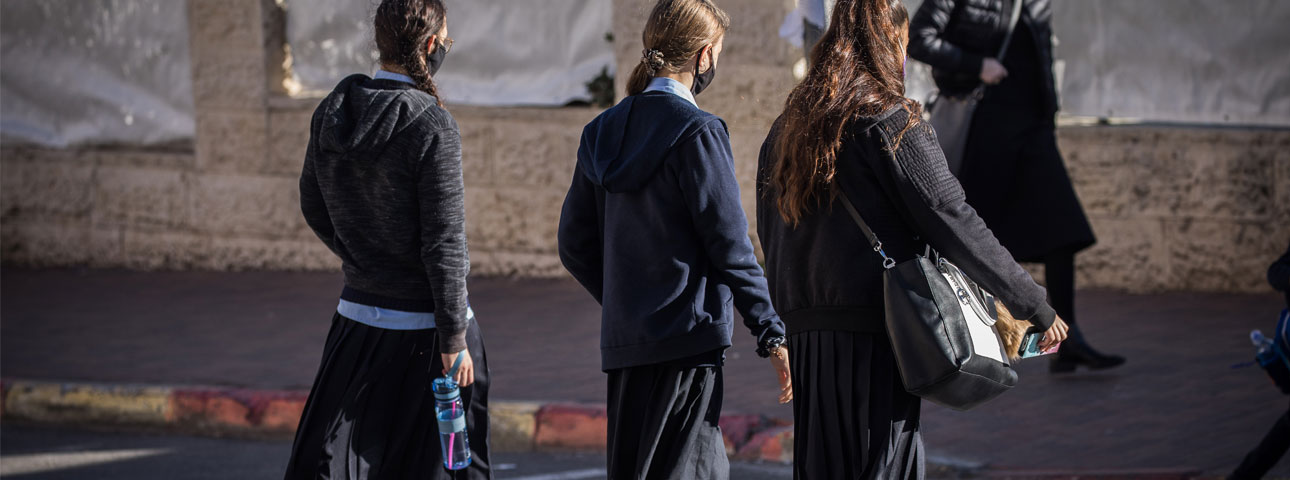The Better to Support their Families: The Education of Ultra-Orthodox Women
Ultra-Orthodox women’s employment in Israel has undergone a revolution in recent years—that is, the diversification of the occupations in which they are employed

Flash 90
Since 1948, there have been two significant changes in the employment of ultra-Orthodox women in Israel. Not many people are aware of the fact that recent years have seen the emergence of a struggle over a third such change.
Let's start at the beginning. In traditional Jewish society, women were tasked with raising children and running the household. But the fact that in recent times, ultra-Orthodox men in Israel have mainly engaged in full-time Torah study and have not worked to support their families, has forced ultra-Orthodox women to become the family’s main breadwinner. Over time, however, what began as a necessity has become widely accepted as a favorable and preferred state of affairs, and one that is supported by the ultra-Orthodox education system. Thus, today’s education and vocational training system for ultra-Orthodox girls is oriented- from the very beginning of elementary school- towards ensuring that they will be able to find employment as adults. The impact of this shift quickly became apparent, as employment rates among ultra-Orthodox women rose from 51% in 2003 to 77% in 2019, reaching almost the same level as among other Jewish women (83%).
Furthermore, ultra-Orthodox women’s employment has undergone a second revolution in recent years—that is, the diversification of the occupations in which they are employed. In the past, the traditionally coveted occupation for ultra-Orthodox women was teaching, which combined a moral value with the opportunity to work within the ultra-Orthodox community, and which offered convenient working hours for mothers also charged with raising children while their husbands were busy studying Torah. However, the excess supply of female teachers relative to the system's demand, meant that many women graduates of teacher training programs were unable to find work. In addition, with the spiraling cost of living, teachers’ salaries, especially for those working part-time, could not cover the costs of supporting a family. As a result, ultra-Orthodox seminars (post-secondary education institutions for young women) began offering a much broader range of subjects, including software engineering, bookkeeping, tax consultancy, and multimedia.
But not everything is rosy. Despite these positive developments and the growing diversity in training and employment, the seminars themselves are less than enthusiastic about preparing their students for occupations beyond the boundaries of what is considered traditionally acceptable, and only do so when no other option exists. They prefer their young women to work in settings within the ultra-Orthodox community, and if possible, to also hold a teaching diploma. The majority of seminar graduates get the message and are indeed employed in ultra-Orthodox settings and work a limited number of hours. And so, the average income among working ultra-Orthodox women remains very low—just two-thirds of that among other Jewish women.
The key to change lies in academic training. Many colleges and universities have recently opened degree tracks designated for ultra-Orthodox women, in a range of fields, including computer science, psychology, social work, and more. Three-year academic degree programs are longer and more demanding than studies for a diploma at ultra-Orthodox seminars, and are also more oriented toward integration into employment in mainstream settings, including in the public sector. Program graduates are able to combine work in the general labor market with maintaining an ultra-Orthodox lifestyle, and no less importantly- they are able to build a career that matches their skills and to reap the financial rewards that come with it. By way of comparison, ultra-Orthodox women with an academic degree earn on average one-third more than those without a degree.
More and more ultra-Orthodox women who finish high school are now choosing to steer clear of seminar studies, and to move directly to academic studies, as they understand that this will be more beneficial to them. In response, the seminars are fighting a stubborn battle against academic institutions, mainly by attempting to influence attitudes toward them among ultra-Orthodox girls, but so far-- have been unsuccessful for the most part. We can only hope that academic studies will indeed increasingly become the norm and offer a practical option for the next generation of young ultra-Orthodox women.
The article was published in the Times of Israel.
